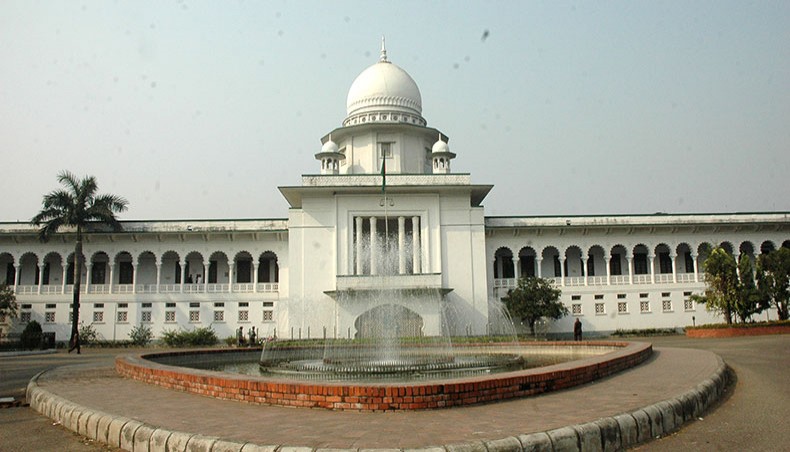
Litigants suffer a lot and have to wait to benefit from High Court verdicts because of the delay in getting written copies of the verdicts pronounced in open courts.
Many lawyers told New Age that their clients had been suffering for long in the condemned cells of different jails despite being acquitted of the charges or having their sentences commuted to life-term from death as the verdicts, which were pronounced in open courts earlier, were not written, signed, or sent to the jails.
‘My client Abdul Jalil has been languishing in a condemned cell of the Barishal Central Jail for more than a year, as a draft High Court verdict delivered on January 29, 2023, commuting his death sentence to life-term has not been finalised by the judges in a year,’ lawyer Masud Rana told New Age on Thursday.
Masud said that he requested the involving judge of the verdict to write an advance order so that Jalil could be shifted to an ordinary cell from the condemned cell, a small room for death-row prisoners who were not allowed to go out of the cell before execution or his acquittal or reduction of the sentence.
Senior lawyer Khurshid Alam Khan said on Friday that the High Court upheld the death sentence of woman prisoner Fatiha Bin Maskura of the Sylhet Central Jail for killing her husband, but the verdict was not written in one year, causing the delay in filing an appeal.
Khurshid said that he was aware of many cases in which full verdicts had not been written for a long time since the pronouncement of the verdicts in open court.
‘I am embarrassed to make comments on the issue,’ he added.
Former Appellate Division judge Md Nizamul Huq called the incident of the detention of acquitted or commuted prisoners in the condemned cell because of the failure to write full verdicts unfortunate.
‘Laziness is the main reason for the delay in writing verdicts pending with judges,’ former High Court judge and senior lawyer Md Nozrul Islam Chowdhury opined.
Lawyers and judges said that there was no enforcement of an Appellate Division verdict delivered in the appeal of sacked additional High Court judge Syed Shahidur Rahman in April 2016, ruling that Supreme Court judges should sign judgements or orders in normal cases promptly and within six months of delivering them in exceptional cases.
Bench officer Saiful Islam said that judges need time to check draft verdicts before putting their signatures on them to make them public.
Bench officers note dictations from the judges while they deliver verdicts in courtrooms.
He said that it was normal for a busy court to take time before releasing a written verdict.
Many lawyers said that they had to manage bench officers so that they could type dictations of the verdicts immediately and place them before the judges for their signature as early as possible.
Lawyer Masud Rana said that the judge concerned in the case of Abdul Jalil refused his request a month ago for issuing an advance order to enable Jalil to be shifted to an ordinary cell from the condemned cell as the written verdict was delayed.
Masud Rana said that he had another case in which a High Court copy was not available for six months.
He said that the lower court could not resume the trial of the house rent case and dispose of it within one year as directed by the High Court in the absence of getting a written copy of the verdict delivered in courtrooms on July 27, 2023.
Masud said that the case between tenant Nurul Anwar and landlord Abdur Rahman over the fixation of the rent of a pharmacy shop in Motijheel in the capital has remained pending with the lower court since 1985.
The Appellate Division, in its full verdict in the appeal of sacked additional High Court judge Syed Shahidur Rahman in April 2016, ruled that Supreme Court judges must sign judgements or orders in normal cases promptly and within six months of delivering them in exceptional cases.
‘A judge should dispose of promptly the business of the court, including avoiding inordinate delay in delivering judgments/orders … a judgment shall be signed not later than six months of the date of delivery of judgment in exceptional cases,’ a four-judge Appellate Division bench chaired by chief justice Surendra Kumar Sinha observed in the full verdict.
The Appellate Division earlier on September 16, 2015, upheld the 2004 dismissal of Syed Shahidur Rahman from the post of additional High Court judge.
The then president, Iajuddin Ahmed, ordered his removal as recommended by the Supreme Judicial Council for receiving Tk 50,000 in bribes to grant bail to an accused in a case under the Women and Children Repression Prevention Act.
The Appellate Division in April 2016 released the full judgement in which it made 39 other observations regarding the code of conduct of judges.
Supreme Court Bar Association president Md Momtazuddin Fakir said that judges used to take time to write full verdicts because ‘writing a verdict is a tough job.’
He urged judges to write verdicts as early as possible, irrespective of their business so that justice seekers could benefit from the verdicts immediately.
Right activist and senior lawyer Sara Hossain said that the fundamental rights of justice seekers had been violated because of the delay in delivering written verdicts to litigation, as the respondents could not take any action in implementing the verdicts.
She also found that the state could not perform its duty, resulting in the delay in getting a verdict copy.
Every justice seeker expects that they will get a copy of the verdict immediately so that they can get immediate benefit from it, she said.
‘It is the duty of the lawyers to ensure that judgements are written immediately after pronouncements of the verdicts in courtrooms,’ Dhaka University law professor Mahbubur Rahman said.
He said that ordinary justice seekers ultimately suffer, as most lawyers do not raise the issue with judges to avoid bad relations.
New Age









